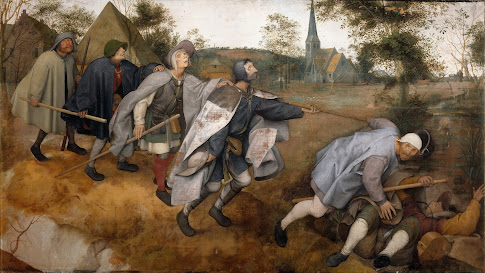Can a blind person guide a blind person?
Will not both fall into a pit?
We might assume that there wouldn't be that many blind guides, people offering navigation services without a map, a sense of direction, or the ability to perceive hazards. But in the time of Jesus the Pharisees were such.
Some of the Pharisees near him heard these things, and said to him, “Are we also blind?” Jesus said to them, “If you were blind, you would have no guilt; but now that you say, ‘We see,’ your guilt remains (see John 9:40-41).
From the Pharisees we can begin to learn why such guides exist so as to avoid availing ourselves of their services, and, hopefully, to avoid becoming like them ourselves. What was the primary problem for the Pharisees? It was their unwillingness to come to terms with their own blindness so as to let themselves be led. They preferred to come up with a list of reasons to prove that they had perfect spiritual sight while ignoring the spiritual ruts and holes into which they consistently fell. It was perhaps the case that they had an instance of the sunk cost fallacy because of their training. They thought that they ought to have known what they needed to know so, rather than confirming whether that was true, they simply insisted they did. After all, they were Pharisees. The position itself seemed to mean that they must have something to offer. But what they actually had to offer was not something anyone would really want.
Woe to you, scribes and Pharisees, hypocrites! For you travel across sea and land to make a single proselyte, and when he becomes a proselyte, you make him twice as much a child of hell as yourselves (see Matthew 23:15).
We risk becoming like the Pharisees because there is much that we believe we ought to know, and holiness we ought to possess, that we do not yet know or possess. But others see us and assume we do know and possess these things. So we play the role rather than disillusion them. We become all too ready to become a central hub of guidance rather than a disciple who points the way to Jesus, the trust master, teacher, and guide.
No disciple is superior to the teacher;
but when fully trained,
every disciple will be like his teacher.
We have the hope of becoming like Jesus our teacher when we continue to act as disciples, sufficiently empty to allow him to fill us, but not so open as to allow ourselves to be filled with whatever noxious substances the world would pour into us given half a chance. What we receive from Jesus is sometimes challenging because it is not always affirming of our choices and way of living. What the world offers is easy to take. It would never suggest there was anything wrong with us, all the while undermining our ability to know and connect with our true purpose. The brew of the world desensitizes us and makes us spiritually slow and sleepy. The living water of Jesus wakes us up and helps us to see. It is the latter that gives life.
Why do you notice the splinter in your brother's eye,
but do not perceive the wooden beam in your own?
When there is some possibility that we are spiritually blind and too self-assured to be taught our initial response is not usually one of critical self-assessment guided by the Holy Spirit. Instead we tend to resort to comparing ourselves to others. Our respond might be, 'It may be true, but at least I'm not like so and so who does such and such'. We want to believe we are good enough. And so we insist that others are not good enough and we are at least better than they. Such motivations make it dangerous when we try to remove a splinter from the eye of our brother. In such a state we're far too blind, too inwardly focused, to perform any successful operations for others.
Remove the wooden beam from your eye first;
then you will see clearly
to remove the splinter in your brother's eye.
We need help to get our own vision clear. Then we will see that we have been loved all along despite whatever our weaknesses and liabilities may have been. Jesus will show us that even while we were sinners he gave his life for us. We could never have earned this gift. Even now there is no sense insisting on our own perfection as though we can pay him back. Instead we should allow ourselves to become disciples, open to what he wants to give, malleable as he trains us, so that we may become more and more like him.

No comments:
Post a Comment